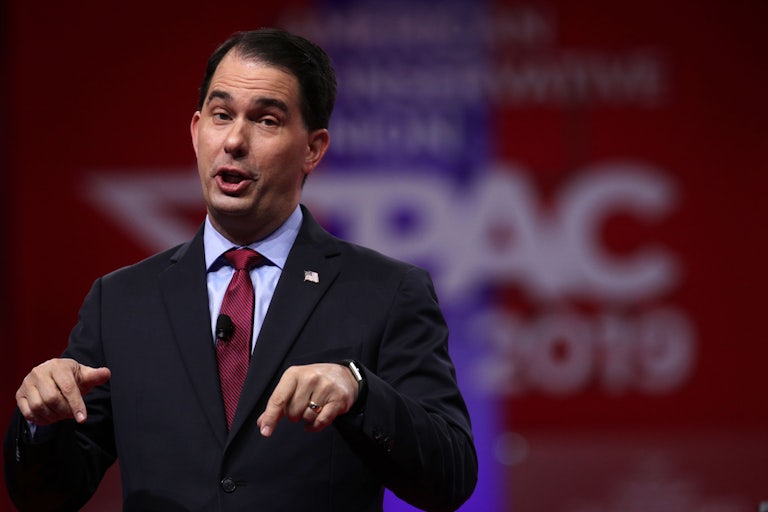Why Is Biden Scared of the Most Logical Solution to Debt Ceiling Insanity?
To avoid a default crisis, the president should combine the power of the Constitution with a touch of Dark Brandon.

Here we go again: sliding headlong into yet another round of brinkmanship over the debt ceiling, with GOP extremists tempting an economy-crippling default. In recent years, this has become a regular occurrence in Washington, a ritual of learned helplessness among our elected leaders. It’s getting to the point where each iteration of this manufactured crisis has its own vintage, with a unique set of tasting notes. As TNR’s Grace Segers reported this week, the 2023 version is highly redolent of the 2011, Obama-era bottling, with a similar scent of failure and flop sweat on the nose, only this time with an especially apocalyptic mouthfeel.
But maybe we don’t have to choke down wine from this poisoned chalice. This week, the Biden administration has started to sound a little more serious about a solution involving the Fourteenth Amendment that would shut down this nonsense—perhaps for good. But according to reports, Biden’s still wavering on the edge, so let’s give him a push.
Every article about the debt ceiling requires a primer to cut through Republicans’ bullshit rhetoric about it. First, “raising” the ceiling has nothing to do with Congress incurring new debts, it merely reaffirms Congress’s commitment to pay the bills it’s already agreed to pay. Second, no other nation on earth except for Denmark has a “debt ceiling,” and the Danes have set their ceiling so high as to be impossible to breach—a good idea, which we should steal. Finally, as TNR contributor Tom Geoghegan has explained at length, the Founders would have rejected the modern-day notion of a “debt ceiling” outright, so anything that defuses or abolishes it is on safe grounds.
But the biggest thing you need to know about the debt ceiling is that it’s fake. It’s not an actual thing. It didn’t exist until 1917, when it was created specifically for the purpose of funding America’s involvement in World War I. It was extended to government debt broadly in 1939, and thus became a political football. For decades, members of Congress have marked the occasion of raising the ceiling with grandstanding speeches about the other side’s spending priorities.
These were fake debates, fake votes, with fake stakes. So anyone who tells you that debt ceiling “debates” are some kind of “norm” is lying to you. As Treasury Secretary Janet Yellen recently pointed out, the debt ceiling has been cleanly raised 78 times since 1960. That’s the “norm.” Even here, “raising the debt ceiling” is more akin to an eldritch incantation than a legislative act.
Two things changed to bring us to the point of crisis. First, President Obama made the fateful decision to use a debt ceiling deadline to invite bipartisan budget negotiations. This coincided with the Republican Party’s shift from a loyal opposition party to a gang of rabid extremists who will treat every debt ceiling deadline under a Democratic president as an opportunity to take hostages. This time around, the GOP’s demands are nonstarters: Either Biden must either tear down his legislative accomplishments and impose painful austerity on the American people, or Republicans will take the country into default.
As I’ve said before, the only way to win at “Debt Ceiling Crisis” is to refuse to play, and in recent days the Biden administration is said to be flirting with an elegant solution to the problem. Namely, invoking the Fourteenth Amendment’s language that the public debt “shall not be questioned” as a permission slip to ignore the fiasco entirely and continue making payments over the objections of the legislative branch. As Vox’s Ian Millhiser notes, the legal arguments backing this play are strong, but they suffer from having never been tested. So it’s not hard to see why Biden, having warmed to the idea, isn’t quite there yet. The president has reportedly expressed concerns that this is not a “viable short-term solution” and that it would invite “litigation” from the GOP and, perhaps, end up at the Supreme Court.
But as TNR contributor Jess Coleman noted on Twitter, this is precisely the wrong way to think about the Fourteenth Amendment solution. “This is a fundamental misunderstanding of how the law works,” he tweeted. “The onus is on those challenging a government action to change the status quo. Biden can blow past the debt ceiling and … nothing would happen. It would be on the courts to stop him. He doesn’t need permission!”
My preferred way of dealing with the debt ceiling is to treat it like the absurdity that it is, ideally with Biden in “Dark Brandon” mode. But the worst possible idea is to have a “debt ceiling debate,” because the debt ceiling is fake and to pretend otherwise is madness. Biden is correct that invoking the Fourteenth Amendment’s passing mention of the public debt leaves open the door to further litigation. But the move would deprive Republicans of the political safe harbor that comes with pretending to be negotiating. If Republicans or their allies in the Supreme Court super-legislature want to take the steps necessary to reimpose the threat of default, they’d have to step forward and do it on their own. It would no longer be on Biden or the Democrats.
This article first appeared in Power Mad, a weekly TNR newsletter authored by deputy editor Jason Linkins. Sign up here.









